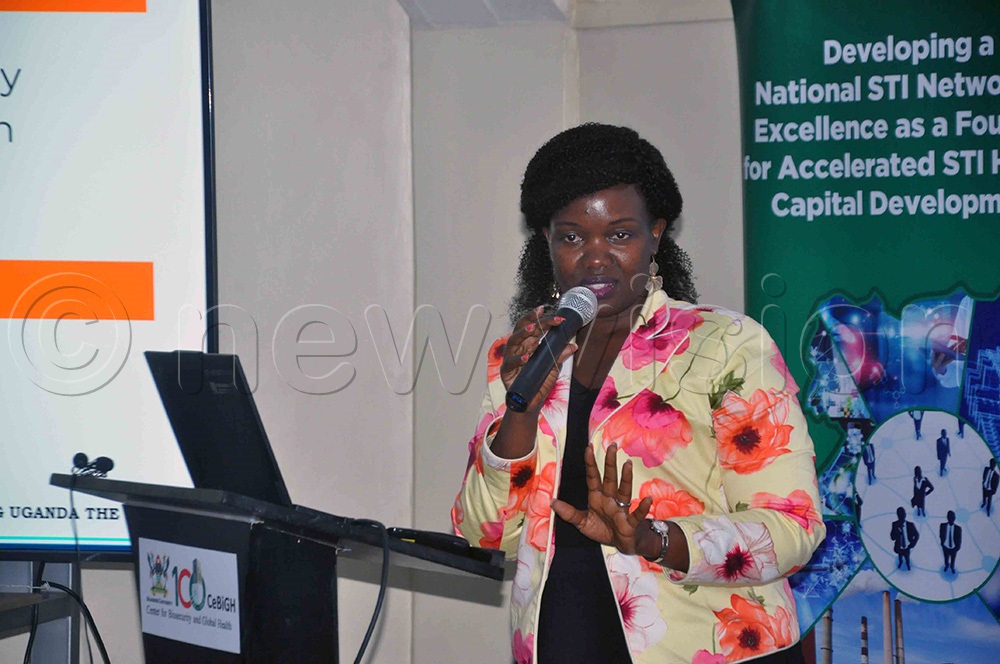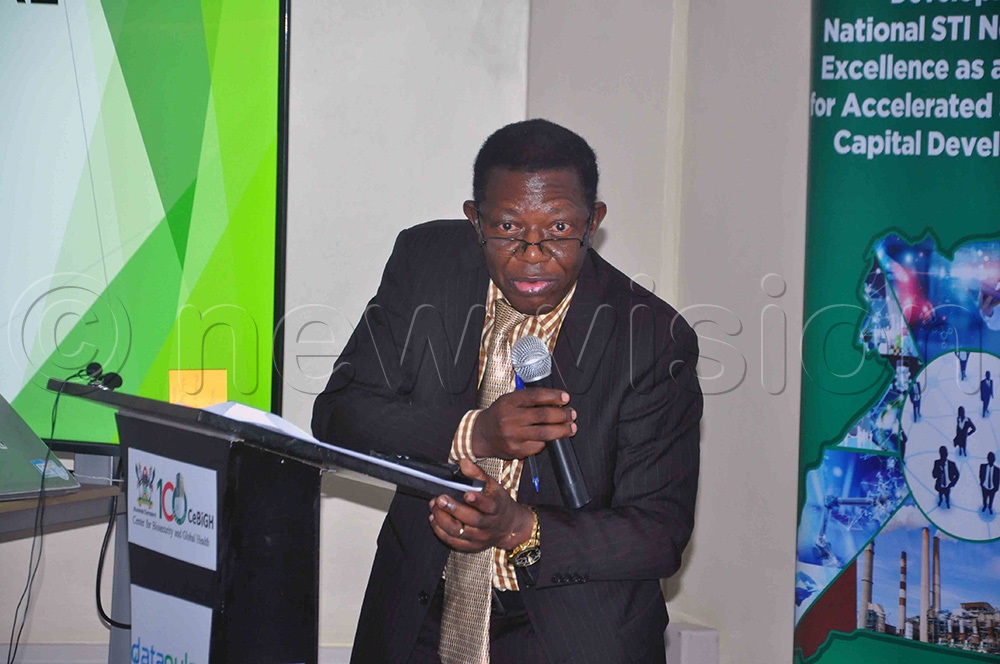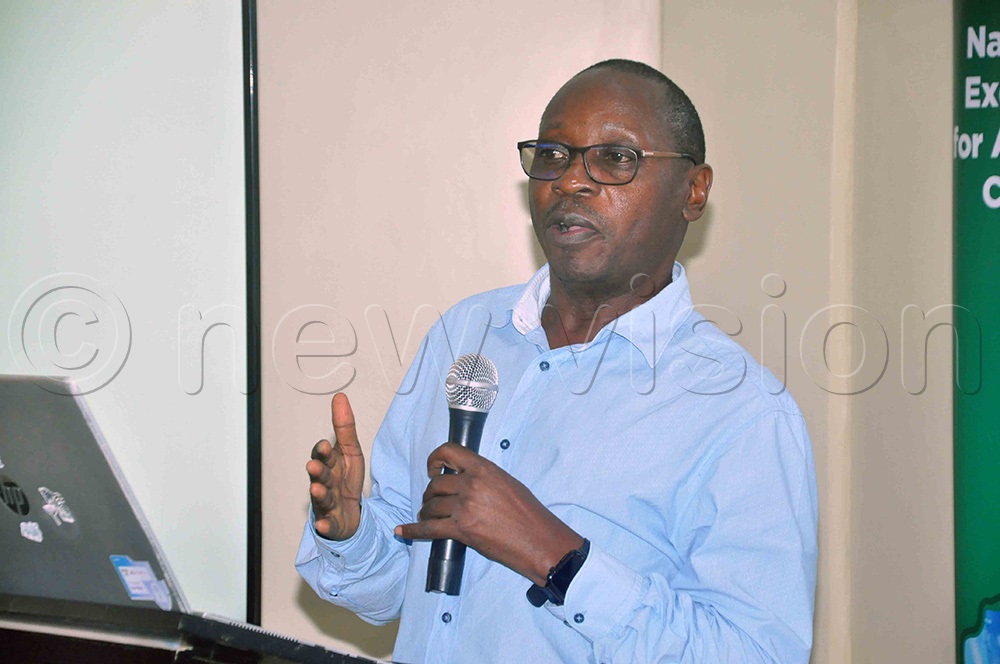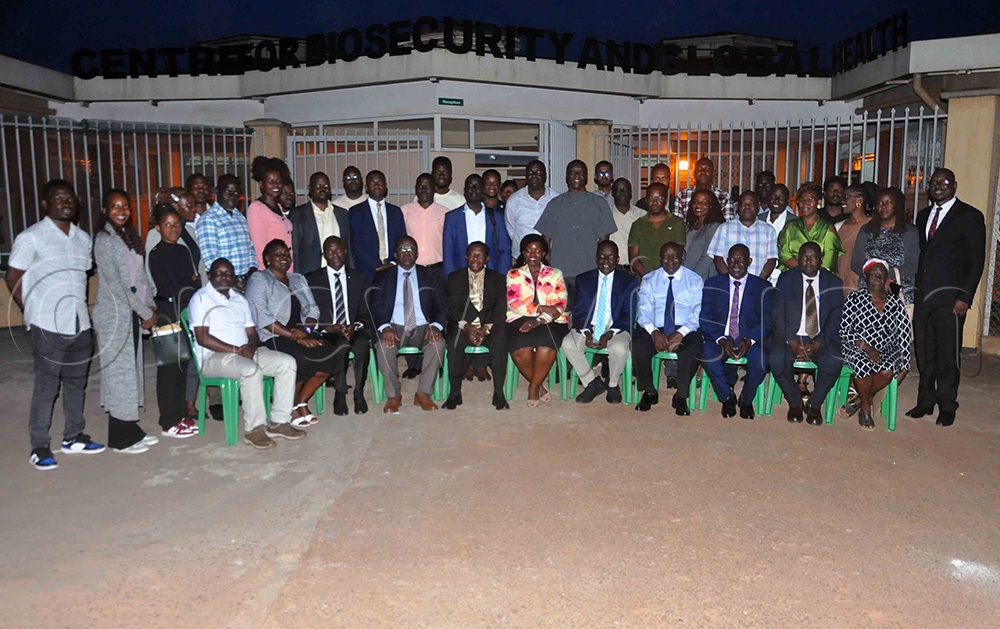Government launches consortium on bioeconomy and biosecurity
The consortium, which will spearhead research and innovation, is based at Makerere University’s College of Veterinary Medicine, Animal Resources and Biosecurity (COVAB).
Brenda Nakazibwe addressing participants attending the launch of the Multidisciplinary Alliance for Global Biosecurity and Bioeconomy (MAGBBA) consortium. (Photo by John Odyek)
_________________
The government has launched a new consortium, the Multidisciplinary Alliance for Global Biosecurity and Bioeconomy (MAGBBA), aimed at addressing growing threats from animal diseases, biothreats and bioterrorism, while also harnessing opportunities within the bioeconomy.
The consortium, which will spearhead research and innovation, is based at Makerere University’s College of Veterinary Medicine, Animal Resources and Biosecurity (COVAB).
The launch was officiated by Dr Monica Musenero, Minister of Science and Technology, who was represented by Brenda Nakazibwe, team leader for the pathogen economy in the Office of the President.
Brenda Nakazibwe addressing participants attending the launch of the Multidisciplinary Alliance for Global Biosecurity and Bioeconomy (MAGBBA) consortium. (Photo by John Odyek)
The event, held at COVAB on September 19, 2025, brought together universities, research institutions and individual experts under the MAGBBA umbrella.
Nakazibwe stressed the importance of science and technology in tackling poverty and underdevelopment. She questioned whether Uganda is adequately converting laboratory research into practical products that improve lives, asking: “Are we getting products from our laboratories to make life better? Where is Uganda getting its drugs and vaccines from?”
She noted that studies will be undertaken to test the safety and quality of herbal medicines, highlighting the risks of poorly tested remedies. With pharmaceutical imports to Sub-Saharan Africa valued at over $9.5 billion (sh33.2 trillion) annually, she emphasised that building local capacity in diagnostics and production can help prevent economic haemorrhage.
Nakazibwe revealed that the Government is currently supporting 56 ventures in the pathogen economy. These ventures, she explained, take time to reach the market because of requirements for good manufacturing practices and regulatory approvals.
The pathogen economy, she said, is a Ugandan initiative designed to reduce dependence on imported health products by fostering local research, innovation and industrial development around vaccines, therapeutics and diagnostics. The target is for the pathogen economy to contribute $142 billion to Uganda’s projected GDP of $500 billion by 2040.
Call for practical science
Prof. Mukadasi Buyinza, the acting deputy vice-chancellor in charge of academic affairs at Makerere University, called for an inventory of dangerous pathogens, pests and diseases in Uganda, coupled with community-based interventions and early-warning systems.

Prof. Mukadasi Buyinza addressing participants attending the launch of the Multidisciplinary Alliance for Global Biosecurity and Bioeconomy (MAGBBA) consortium. (Photo by John Odyek)
“It is a business for all to promote biosecurity and biosafety and ensure long-term security,” Buyinza said. He urged scientists to produce tangible solutions rather than limiting their work to academic publications.
Prof Enock Matovu, the director of the Centre for Biosecurity and Global Health at COVAB, highlighted that 60–80% of infections are of animal origin. Matovu warned that increased human–animal contact, wildlife hunting, intensive farming and live animal markets continue to drive zoonotic disease transmission.
He cited rabies, avian influenza, Ebola, SARS, COVID-19, monkeypox and Zika virus among threats arising from such interactions.

Prof Enock Matovu addressing participants attending the launch of the Multidisciplinary Alliance for Global Biosecurity and Bioeconomy (MAGBBA) consortium. (Photo by John Odyek)
“There is a huge void in national preparedness to respond to epidemics and pandemics, particularly zoonoses and chemical threats,” Matovu added.
Research and agricultural innovation
Dr Ejiet John Wasige from Busitema University drew attention to soil fertility, noting that it is directly tied to hunger and poverty in the Global South. Wasige explained that climate change has already reduced agricultural productivity growth in Africa by 34% since 1961, more than in any other region.
Prof. John David Kabasa of COVAB outlined how biological threats manifest: through zoonoses (the natural spread of diseases from animals to humans), weeds, bioerror (accidental pathogen release) and bioterror (intentional misuse of biological agents).
Kabasa underscored the importance of turning bio-assets into industry, jobs and economic growth. “Commodity prices do not yield adequate jobs and development benefits. The rigorous formula today is amplifying the value of huge bio-assets to grow industry, employment and the economy,” Kabasa said.
Prof. Samuel Majalija, director of research at the National Agricultural Research Organisation (NARO), explained that MAGBBA evolved from the Consortium for Integrated Management of Transboundary Diseases and Zoonoses (CIMTRADZ).
Majalija outlined ongoing research under NARO in dairy health, breeding and genomics, forage conservation, beef production, vaccinology and vaccine development — including efforts on foot-and-mouth disease, African swine fever, lumpy skin disease and Newcastle disease.
In addition, research is ongoing in insects for food and feed, including bee health, black soldier fly projects and tsetse fly control. Other programmes address pesticide safety, microbial acaricides for tick control, food and feed safety, and contaminant detection in livestock products.
Training and capacity building
Dr Claire M. Mugasa, dean of the School of Biosecurity, Biotechnical and Laboratory Sciences at Makerere University, said their mandate is training, research and outreach in biosecurity, biosafety and biomedical technologies. She noted that their mission is to build human capacity to advance health and development in Uganda and beyond.

Participants and facilitators who attended the commissioning of the Multidisciplinary Alliance for Global Biosecurity and Bioeconomy (MAGBBA) consortium at the College of Veterinary Medicine, Animal Resources and Biosecurity (COVAB) at Makerere University. (Photo by John Odyek)
The meeting reflected on the journey since 2013, when CIMTRADZ was established, reviewed achievements, and set the stage for the transition into MAGBBA.
William Okello from Soroti University announced plans to develop a food supplement from algae. Dr Tendo David emphasised the need to demystify science, technology and innovation by translating them into workable community-based solutions that improve household incomes and food security.